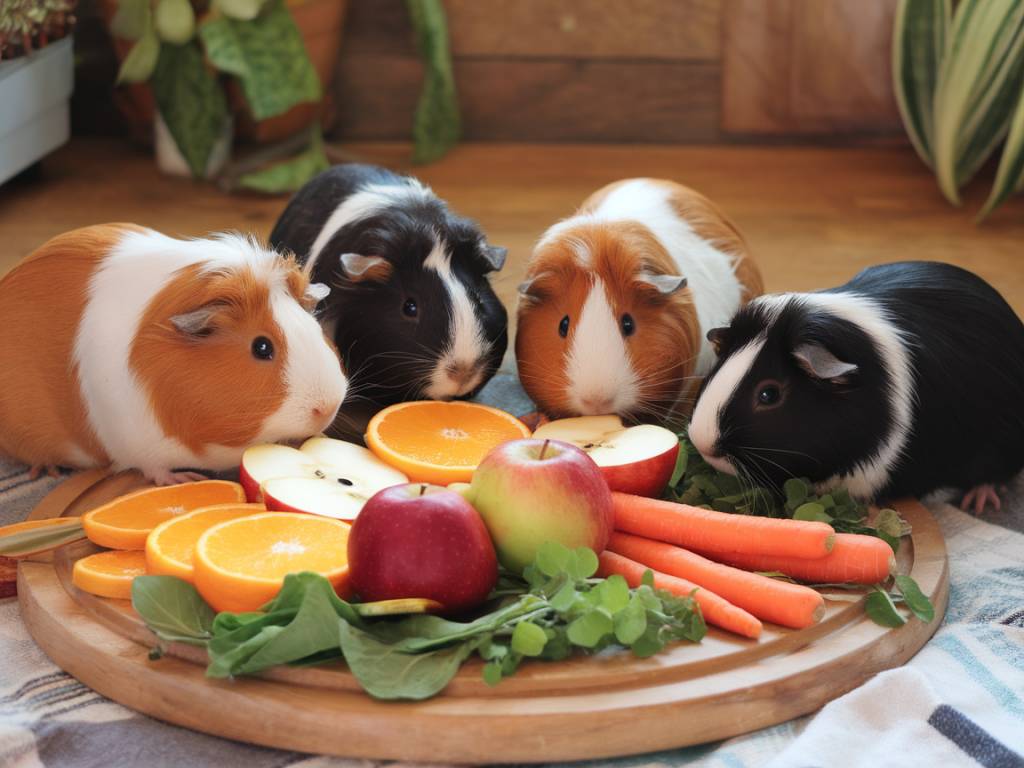the role of vitamin c in guinea pig diets: how to avoid deficiencies

the role of vitamin c in guinea pig diets: how to avoid deficiencies
« `html
Understanding the Importance of Vitamin C in Guinea Pig Diets
Guinea pigs, also known as cavies, are delightful small pets with individual personalities. However, their dietary needs require careful attention, particularly concerning Vitamin C intake. Unlike most other small animals, guinea pigs cannot produce Vitamin C naturally. This essential vitamin plays a pivotal role in maintaining their overall health, and any deficiency can lead to serious health problems.
Many pet owners might wonder why a guinea pig would require special attention in terms of Vitamin C, especially compared to other animals. The answer lies in their unique physiological makeup. Just like humans, guinea pigs lack the ability to synthesize Vitamin C on their own due to an evolutionary mutation. Therefore, ensuring they receive sufficient amounts through their diet is critical.
The Functions of Vitamin C in Guinea Pigs
Vitamin C, or ascorbic acid, is integral to several bodily processes in guinea pigs.
- Collagen Production: Vitamin C is crucial for the synthesis of collagen, a protein that is an essential component of connective tissues, skin, and even blood vessels. Without adequate collagen production, guinea pigs can suffer from symptoms like joint pain and blood vessel fragility.
- Immune System Support: It enhances the immune system, helping guinea pigs fend off common illnesses. A robust immune response ensures that your guinea pig remains healthy and vibrant.
- Prevention of Scurvy: A lack of Vitamin C leads to a condition known as scurvy, characterized by weakness, lethargy, swollen joints, and weight loss. This condition is relatively easy to prevent with proper dietary management.
Identifying Symptoms of Vitamin C Deficiency
Being aware of the signs of Vitamin C deficiency can guide you in adjusting your guinea pig’s diet before the condition becomes severe:
- Loss of appetite and weight
- Lethargy or reluctance to move
- Swollen joints and pain when moving
- Rough or unkempt fur
- Frequent infections due to a weakened immune system
If your guinea pig exhibits these symptoms, it’s essential to consult with a veterinarian who specializes in small animals to confirm whether a deficiency is the cause and to discuss the best course of action.
Ensuring Adequate Vitamin C Intake
Incorporating Vitamin C into your guinea pig’s diet requires a balanced approach:
Pelleted Diets
Commercial guinea pig pellets fortified with Vitamin C are a convenient option. However, Vitamin C degrades over time, particularly with exposure to light and air, so it’s vital to check the expiration date on pellet bags and store them properly to retain their nutritional value.
Fresh Vegetables and Fruits
Guinea pigs love fresh produce, which can be an excellent source of Vitamin C. However, it’s crucial to choose the right types and offer them in moderation:
- Bell Peppers: Both green and red bell peppers are rich in Vitamin C and low in sugar, making them an ideal supplement.
- Kale and Spinach: These leafy greens are not only rich in Vitamin C but also provide other vital nutrients. However, because they contain oxalates, they should be fed sparingly.
- Strawberries and Oranges: While these fruits are high in Vitamin C, their sugar content requires careful moderation.
Vitamin C Supplements
If you’re concerned that your guinea pig’s diet may not provide sufficient Vitamin C, supplements can be beneficial. Liquid Vitamin C can be added to water bottles, but fresh preparation is crucial as Vitamin C breaks down rapidly in water. A more reliable method is providing these supplements directly in the form of chewable tablets or drops, ensuring they receive an accurate dosage.
Maintaining a Balanced Diet
A guinea pig’s health doesn’t just depend on Vitamin C. A comprehensive diet includes a variety of fresh vegetables, unlimited hay for fiber, and a small number of pellets. Avoid seeds and nuts, which are often too high in fat and can lead to obesity and other health issues.
Fresh water should always be available and changed regularly to ensure cleanliness. Remember not to add Vitamin C supplements to water if your guinea pig is also getting them in their diet through other means, to avoid over-supplementation.
Daily Care Tips for Healthy Guinea Pigs
Taking care of guinea pigs involves more than just dietary needs. Here are some additional tips:
- Regular Veterinary Check-ups: Annual veterinary visits help catch any health problems early, including issues related to diet deficiencies.
- Monitoring Weight and Behavior: Keep an eye on your guinea pig’s weight and be attentive to their behavior. Any sudden changes could indicate health problems.
- Clean Habitat: Ensure their living environment is clean and comfortable to prevent stress and disease.
Educating Yourself and Consulting Experts
Always stay informed about guinea pig care from reliable sources. Whether it’s books, online resources, or expert advice, widening your knowledge helps you provide the best life for your pet. If ever in doubt, consulting with a vet or an animal nutritionist specializing in small animals can offer guidance tailored to your guinea pig’s specific needs.
By understanding and maintaining proper Vitamin C levels, you can ensure your guinea pig leads a healthy, happy, and active life. Attention to dietary needs will not only prolong their life but enhance their quality of life, ensuring many cheerful and vibrant days for your little furry friend.
— Lisa Tissed
« `





